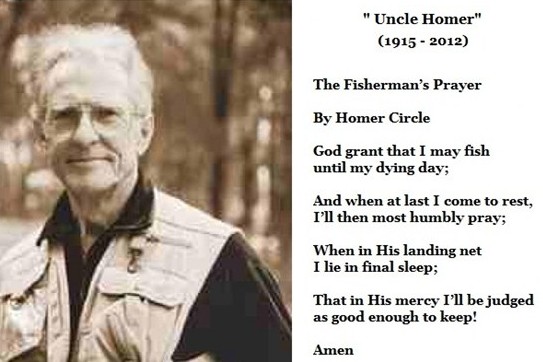Uncle Homer passes away

During the first induction banquets of the Bass Fishing Hall of Fame a few years ago, the acceptance speeches of the pros usually opened with the same general theme. They began their remarks by thanking God, their families and Homer Circle, though not necessarily in that order.
Homer, who died peacefully last week at his home in Ocala, Fla., was the nearest thing to the Almighty on earth for a lot of pros who struggled to make a name and establish tournament bass fishing in the sport’s infancy. Homer, 97, served them well as an outdoor writer and chronicler of the most important outdoor events to have taken place in the latter part of the 20th century. Himself an inductee in the first Hall of Fame class, along with Forrest Wood, Ray Scott, Larry Nixon, Roland Martin and others, the Ohio-born writer accomplished more than most men could do in three lifetimes. At various stages of his long illustrious career in the outdoors, Circle was a product manager for Heddon Lures, a publicist for Daisy BB Guns, a fishing columnist for Sports Afield, bass columnist for Outdoor Life, columnist for Bassmaster Magazine, and a TV show host. Mostly, though, he was the all-around “Uncle Homer” to the dreamers who wanted to scramble out of their mundane lives and become touring pros, and who benefited greatly from the publicity he was able to bestow upon them.
Homer was at the beginning of everything, or so it seemed. He was at Ray Scott’s first tournament on Beaver Lake and gave the prayer that opened the awards banquet there. He was at the first Classic and rode in the first Ranger. In 1953, Homer attended the very first ICAST Show (called the AFTMA show then) in Chicago’s Conrad Hilton Hotel, and subsequently witnessed the births of many fishing innovations. He hobnobbed with all who became legends in bass fishing, and in fact helped make some of them legends through his writing. Being mentioned in one of Homer Circle’s articles counted for something in the fishing industry, and having him write about the benefits of a particular rod, reel, lure or line was as good as the best endorsement from other sources.
Indeed, it was as a writer that Homer reached his zenith. The respect he garnered among the outdoor media equaled that of rank-and-file fishermen and outdoor industry honchos. His attendance at a press conference or writer’s conclave legitimized its importance. Homer was among the first presidents of the Outdoor Writers Association of America, and one of its most prestigious service awards was named for him. Later, after he helped found the Professional Outdoor Media Association, a similar writing award bore his name. He was the dean of writers, and the kindly godfather who seemed to watch over them, no matter how inconsequential they might think of themselves or seemingly far away from his purview.
When I went to work for Outdoor Life in New York City in 2000, one of the first pieces of mail I received was a congratulatory note from Homer. It was not unusual of him to notice such things, whether it involved a new editor in New York or a new columnist at a daily paper in the hinterlands. He was a gentleman of the first order and his manners hearkened back to a better time, but his all-encompassing regard for fellow scribes was also a reflection of the importance that he accorded his profession.
Toward the end of his life, film producer and photographer Glen Lau became Homer’s closest companion. In the 70s, Homer was the fisherman in Bigmouth, the movie that catapulted Glen to the forefront of the fishing world, and their friendship was that of a father and son more so than that of two comrades with similar interests. Glen was inducted in the Hall of Fame this year, and he, too, paid Homer his dues.
In 2007, Gayle, Homer’s wife of 70 years and whom he always described as his “child bride,” passed away after suffering through Alzeimer’s for a number of years. As might be expected, when Gayle left much of Homer’s happiness left with her. Yet he never felt sorry for himself or dwelled on the negative aspects of his life. I would call him once in a while and ask how he was getting on. “I’m the luckiest man who ever lived,” or “God’s sure been good to me,” were the usual replies. It was as if he knew that to say otherwise would make those who loved him fret, and his compassion and generosity would not allow it.
Full of years and memories, Homer outlived most of his audience, but he nevertheless understood that God had granted him a wonderful and fulfilling life. He appreciated the multitude of tributes he received from those he had helped – the accolades from anglers and company presidents, writers and readers – but what he had always valued the most had been their friendship.